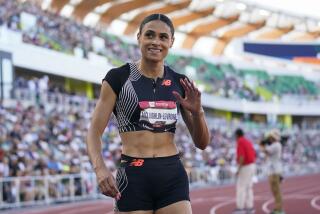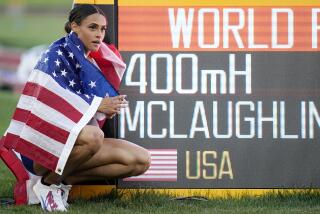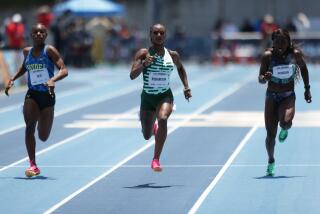Running Moves Into First Place : Up Until Now Kathy Kanes Was Busy Pursuing Her Ph.D.
- Share via
For the first time in her life, track has become the top priority for distance runner Kathy Kanes.
Over the years, running has always taken a back seat to education for the 28-year-old resident of Pasadena.
When she was a senior in high school in Irmo, S.C., her biggest desire was to appear on a local television show called “Battle of the Brains.”
“I was always kind of a nerd,” she recalled. “I didn’t start my senior season with the idea of competing because I wanted to be on ‘Battle of the Brains.’ ”
At Bryn Mawr College in Pennsylvania, an all-women’s school, Kanes rarely had the opportunity to compete because the school didn’t have a track team.
“I ran off and on,” she said. “They didn’t even have a club team until my senior year.”
More recently, as a graduate student at Caltech in Pasadena, her track career ran a distant second the last three months while she was completing work on her Ph.D. in chemistry. The topic of her thesis was “Biophysical and Biochemical Studies of the Anion Transport Protein in Red Blood Cells.”
“I’d take off a little for track,” she said. “But my life was mostly my thesis and track, and that was pretty much it.”
She is still working on postdoctorate studies at Caltech. But with the arduous task of her thesis completed, Kanes finally has more time to devote to running.
For Kanes, it couldn’t come at a better time.
Her coach, Carlos Godoy, said Kanes still has considerable potential for improvement and he has noticed a marked change in her performance since she joined his Pasadena-based Team Pilo Track Club nearly two years ago.
“When she came to see me at the track she was not the kind of runner that she is today,” said Godoy, a 10,000-meter and marathon runner who competed in the Olympics in 1976 and 1980 for his native Columbia. “I designed a special program for her to build on and make her stronger as a runner. When she first came to me she was about 4:28 to 4:30 in the 1,500 meters, and now she’s about 4:19 to 4:20. That’s quite a lot of improvement.”
She has also improved in the 3,000 meters, where she posted a career-best mark of 9:20 at the Mt. San Antonio College Relays in April.
With marks such as those, it is understandable why Godoy thinks the best years for Kanes are ahead.
“Give her a little more time and you’ll see a big difference in her,” he says. “She has tremendous ability and she’s very disciplined. Her enemy before was her studies. That took a lot of her time. But she should have more time now.”
Not that she wasn’t an outstanding runner before.
In high school she was an all-state runner in cross-country and also excelled in track. But she was more concerned about her education.
“At that point, I didn’t really care that much about it,” she said. “Typically, I would make it through the season and quit because I wanted to do my homework.”
After three years at Bryn Mawr, Kanes arrived at Caltech with the intention of devoting more time to running.
She trained with successful track coaches Chuck DeBus and Skip Stolley.
Only she found that the long hours of studying and laboratory work, plus a long commute from Pasadena to a track club in Santa Monica, were not conducive to improving her skills as a runner.
“I’d wake up early to go to lab, leave at 3 p.m. to train and get back to work at about 7,” Kanes said. “I didn’t do anything else. I’d go home and be exhausted all the time.”
That is why Kanes said she has switched coaches often during her career: “I’ve switched coaches a lot because I don’t like commuting.”
Kanes said the training regimen has not been as difficult since she started working out with the club in Pasadena, which trains at Caltech. She has also done more training on her own.
“Usually things are easier now because the coach is in the area,” she said. “That’s the really good thing about it. I don’t have to commute and Caltech lets me use the track.”
Kanes was slowed more recently by other problems, including a pinched nerve in her back. She had also been living in the home of actress Chloe Webb in Pasadena and moved out recently.
“It just throws you out of whack,” Kanes said. “Even if you’re pretty healthy, with the moving and the thesis, it takes a lot out of you.”
Getting past her thesis, though, was the most difficult hurdle.
“I was in a bad period for two months,” she said. “I pretty much stayed away from people during that time. I didn’t sleep much and I was skipping meals.”
At 5-7 with a slender build, Kanes could ill-afford to miss meals.
But with the thesis and Ph.D. behind her, Kanes has more hope for her track career. “I fully expect to do better now that that is finished,” she said.
With a more open schedule, Godoy is hoping Kanes will be able to compete in international meets in the fall. “I’d like to see her compete in a few meets in Italy and in Europe,” he said.
In the meantime, Kanes has been invited to compete in the mile at the Jack in the Box Invitational on Aug. 6 at UCLA’s Drake Stadium. Among other entrants will be distance star Mary Decker Slaney.
Al Franken, longtime track promoter, said: “We’ve been doing these meets for 30 years and I’m sure she’s the first Caltech person to compete.”
Kanes admitted she will face tough competition at the meet but “I don’t expect to finish last.”
She looks forward to competing in bigger meets such as the Mt. Sac Relays and Franken’s meet.
“The fun thing about Al’s meet is they always have a lot of spectators,” Kanes said. “Some of the meets have about 100 people in the stands. His meets are always well-attended and he always attracts good fields.”
Kanes says she didn’t always enjoy competing in the bigger meets.
“That’s kind of a recent phenomenon,” she said. “Before, I’d do well in the meets where nobody was there, and when I got to the big meets I’d do awful. But now when I get to the big meets, I sort of rise to the occasion more.
“It has a lot to do with experience and that’s a really good opportunity to get to compete in the bigger meets.”
With her solid background in chemistry, Kanes doesn’t know how long she will be competing on the track circuit although she figures to stay with it at least until she turns 30.
“I plan to work really hard (in track) the next couple of years,” she said. “I think there have been times when I’ve had to make choices between graduate school and running and grad school won because you had to live.”
She said she receives payments for her work at Caltech and gets a little money for running in meets but that it primarily goes toward expenses.
“It does supplement things,” she said of her earnings from track. “I’m not going to get rich from it. I can’t even break even. But, on the other hand, I can’t even make enough money as a graduate student so it’s a nice supplement.”
Despite her financial predicament, Kanes is hardly looking for an outpouring of sympathy.
“I don’t think I’m special case,” she said. “There are a lot of really good runners who are struggling. It’s hard to get the finances. I don’t know how some of them do it.”
Kanes is happy that, unlike some runners on the circuit, she has an alternative.
“At least I have something to fall back on,” she said. “I have a job and I don’t have to rely on track for a living.”
Yes, it’s nice to have alternatives. But, for the first time in her life, Kanes can say that her top priority at the moment is her career in track.
More to Read
Go beyond the scoreboard
Get the latest on L.A.'s teams in the daily Sports Report newsletter.
You may occasionally receive promotional content from the Los Angeles Times.






